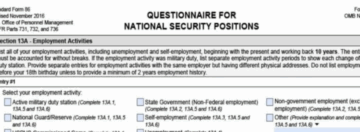Companies Use Loophole in Keeping Clearance Active

In accordance with Executive Orders and policy guidance from the Office of the Director of National Intelligence, the granting of a security clearance should only be done when there is a legitimate need for access to classified information. Defense Industry companies are highly encouraged to keep the numbers of cleared employees to a minimum. However, some try to position themselves favorably for future contract bids by keeping employee clearances active even though they may not be working on a classified contract. This practice is especially prevalent in the Intelligence Community because of the work they do and who they partner with.
As an example, a recent story broke about how a number of cybersecurity contractors who worked for the National Security Agency (NSA) were tasked to provide support to the United Arab Emirates for a special project. The employees had concerns about potentially losing their clearances because of working on a unclassified contract with a foreign government Their company used a loophole by placing them on the cleared roster of another classified NSA contract even though they did not actually work on it. This ensured the employees would keep their clearance while completing work on the unclassified contract.
Although this is technically legal, it does seem a bit sketchy keeping contractor employee clearances who are working on various contracts which may not require access to classified information. This is, however, a common industry practice and allows companies to have a pool of cleared candidates ready for whatever may come down the pike without having to worry about lapses in coverage or waiting for background investigations to get done.



There’s another angle to this that I would like to share, about the tendency to keep senior managers in access: I used to work at a company that once had lots of classified work, including a number of programs requiring SCI access for different customers. Whereas in the past it was easy to keep people cleared even if they were not working an SCI program. in the past few years, it all became much more closely managed. The numbers went way down, especially as we had less and less compartmented business. Collateral clearances were not a problem, lots of people had ‘secret’ who hadn’t worked a classified program in quite a while.
Yet for some reason, we were able to keep high level managers in access! I don’t know if this was a company decision or if the government somehow supported it, but rather than keep someone in active status who stood a chance of doing some actual work, these senior managers would be ‘active’ when all they did was chase new business or maybe participate in the occasional high-level meeting with the customer. After I left, I heard we had fewer than 20 people still ‘active’ and only about five of them were engineers… the rest were all managers.
Companies still have classified knowledge, including paperwork and other forms of information long after they stop working classified projects. Upper level management likely needs to maintain clearance in order to properly maintain this information AND in order to discuss future classified work with government sources.
I think it is much more a wink wink nudge nudge…your company principles were our previous SES and SIS members…Not saying its fair…just how business works. Certainly northern Va Md.
The place where I was, we could not get cleared new hires briefed because there were no ‘open’ billets even though there were half a dozen senior managers who rarely set foot in the SCIF occupying billets.
When the client security office holds fast on that interpretation…they need push back to respective COTR and give an ultimatum. Cut those senior folks or suffer low performance award fee in security. As long as the principles are within 2 years of clearance dates they can easily be turned back on. But having vacant seats due to strict one up…one down…no margin of error.